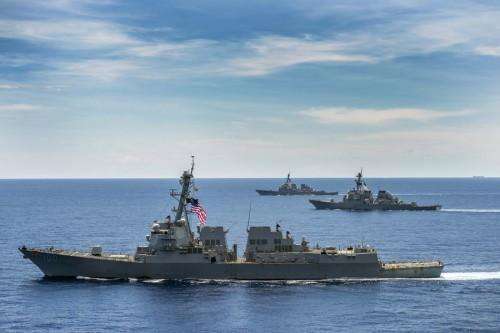
By Prof. Su Hao
Robert O'Brien, Assistant to the US President for National Security Affairs, said in a recent statement that the US Coast Guard would base enhanced Fast Response Cutters in the western Pacific to carry out maritime security tasks and counter Chinese activities.
Isn’t it bizarre that the US Coast Guard, an enforcement force tasked with safeguarding America’s maritime rights and interests, would be assigned across the Pacific Ocean to operate in East Asian waters?
According to international conventions, the Coast Guard is responsible for ensuring a country’s coastal security, sovereignty over territorial waters, and rights and interests in the maritime exclusive economic zone.
Although the Coast Guard is one of America’s armed forces, it is a comprehensive enforcement force on the sea directly under the Department of Homeland Security, which distinctly differentiates it from the other forces under the Department of the US Defense.
In the past, the US Coast Guard has only operated in sea areas around the US territory, performing such tasks as maritime rescue and relief, homeland defense, safeguarding maritime security, waterway management, and protecting marine resources.
But it is this force that protects America’s own maritime security, rights and interests that has more than once appeared in East Asian waters over recent years and even carried out patrol operations in the South China Sea.
On September 3, 2018, the US Coast Guard trained the maritime law enforcement forces of Southeast Asian countries as part of the Southeast Asia Cooperation and Training (SEACAT) exercises.
In January 2019, it deployed the first US Coast Guard Cutter USCGC Bertholf (WMSL-750) in the Western Pacific, which transited the Taiwan Strait in March for the first time, followed by the flagrant operations by the Legend-class cutter USCGC Stratton (WMSL-752) in waters of the Yellow Sea and the South China Sea.
Almost at the same time, Admiral Karl L. Schultz, Commandant of the United States Coast Guard, said publicly that his force was actively promoting deployments in the Western Pacific and might carry out “freedom of navigation operations” in place of the US navy in the future, which was far beyond its mandate and violated the internationally acknowledged standards concerning the services of maritime enforcement forces.
The US that believes in hegemonism used to extend its domestic laws beyond its borders and exercise the so-called judicial jurisdiction over other countries’ actions that it deems in violation of its own interests by way of the “long-arm jurisdiction”.
Being used to having its way on the sea, Washington is now attempting to interfere in the affairs of territorially unrelated sea regions by dispatching its law enforcement force there that is originally tasked with protecting its own maritime rights and interests. As a result, the US Coast Guard is also exercising the so-called long-arm jurisdiction and making baseless interference in South China Sea affairs.
O’Brien’s remarks and the US Coast Guard’s recent moves have presented some risks against which we should be vigilant.
First, the US Coast Guard’s enhanced deployments and so-called law enforcement operations in East Asian waters will undermine the sovereignty and right of regional countries to protect their own maritime rights and interests.
Once the US sets such a precedent, it will have the reference to, on the excuse of national security, make waves in any water around the world, which will disrupt the maritime security order that has been maintained by the international community for a long time.
Second, the US plans to build a forward base for its Coast Guard at Samoa in the South Pacific to reinforce its maritime strength against China, which will increase the risk of China-US frictions and conflicts on the sea.
Third, the US’ attempt to set up berthing bases for its Coast Guard in countries around the South China Sea will lead to a direct military confrontation between these countries and China, thus aggravating conflicts among regional members.
Fourth, if the US employs Coast Guard ships or even joins other countries in challenging China’s maritime rights and interests, it will create a state of turmoil and conflict and sharply exacerbate the maritime security situation in the region.
Should that happen, waters in the Western Pacific would find no peace anymore. The US’ new move of long-arm jurisdiction would give more credit to the claim that Washington is the real trouble maker in the South China Sea.
(The author is the Director of the Center for Strategic and Peace Studies at China Foreign Affairs University.)













